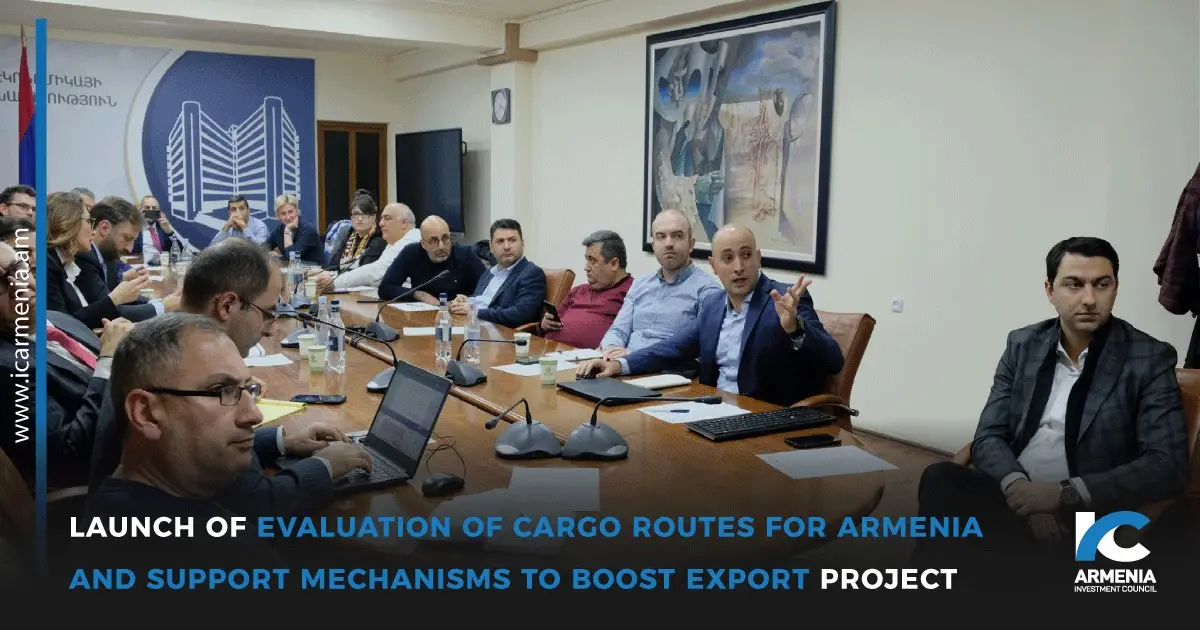26th April 2023
Evaluation of cargo routes for Armenia and support mechanisms to boost export project officially launched
Other
Sub-Council

On April 13th the launch event of “Evaluation of cargo routes for Armenia and support mechanisms to boost export" took place, sharing data on the initial findings of the project’s research phase with the invited stakeholders.
The project is jointly coordinated by the RA Ministry of Economy and EBRD's Investment Council of Armenia, with the support of the UK Government's Good Governance Fund. The project focuses on the identification of Armenia's export potential and the development of appropriate support mechanisms to boost the export of products with growth potential and contribute to the country's economic growth. The implementation of the project includes several stages: sectoral research and data collection, data analysis, design and development of state support mechanisms package.
RA Deputy Minister of Economy Rafael Gevorgyan made an opening speech at the event, stressing the importance of revealing the export potential and the cooperative approach of all interested stakeholders in this matter. It is very important for us to get feedback from the private sector, map the problems and design more targeted solutions to fully realize Armenia's export potential”, he said.
George Akhalkatsi, Head of Yerevan office of the European Bank for Reconstruction and Development mentioned in his speech: “ Understanding the export potential of Armenian products can help local businesses to access new markets and customers, while increasing sales and revenues. Mapping and assessing efficient cargo routes is key for Armenia's economy, as it impacts the country's export potential. The implementation of the project will provide valuable insights into the logistics routes in Armenia. It will help to identify potential bottlenecks and opportunities for improvement. I hope this project will also serve as a foundation for further collaboration and create synergy among all interested actors”.
UK Ambassador to Armenia John Gallagher said: “Trade is a crucial driver for both economic growth and stable relationships. This requires effective logistics routes. I’m pleased that through our Good Governance Fund, the UK is providing valuable assistance to the Ministry of Economy to identify Armenia’s full export potential and transportation capacity constraints. This analysis will inform effective, evidence-based policies to reduce logistics costs, increase competitiveness and unlock greater international trade. This is key to Armenia’s prosperity and sustainable economic development.’’
During the launch event the project experts presented detailed analysis of the goods produced in Armenia with high export potential, for which export remains subdued due to high transportation costs to their target markets. Presentation also covered an analysis of logistics routes in Armenia. In particular, evaluation of cargo costs (air, rail, truck, maritime, multimodal) of exports for the identified product categories and imports connecting Armenia and its potential target markets for the presented routes.
World Bank’s Logistics Performance Index, published in 2018, Armenia is ranked 92nd out of 160 countries, with a 2.61 LPI rate. Black Sea is the main sea for Armenia connecting to the outside world. The Black Sea port system is generally considered as a secondary port system in the European port scene. Poti and Batumi are rather small ports and do not attract major shipping lines. Airfreight is an option that clearly is not affected by the landlocked state of Armenia and should attract special attention of the Government, however, the only cargo plane service is an once a week flight to Liege, Belgium. Almost 20 thousand tons were transported in and out Zvartnots International Airport, most of air cargo is the transported in the baggage compartment of regular passenger services. The demand for air freight is in general limited by cost, typically priced 4–5 times that of road transport and 12–16 times that of sea transport.
The presentation was attended by thet field experts, economists, representatives of private and public sector, and thematic expert discussions followed the presentation part.
The next stages of the project include data analysis, development of economic models of relevant state support mechanisms and assessment of their possible economic impact. Based on the project results, the corresponding state support mechanisms for the sectoral private companies will be designed and a package will be presented to the Ministry of Economy for further execution.
All project related updates will be published in the “News” section of the website.